Every month, we pick a few topics for exploration. The topics we select aren’t meant to cover every issue area facing the progressive community, but rather to give actionable advice on how to talk about key issue areas. We’ll be sharing our findings throughout the month, and in this volume we focus on:
What are the best arguments progressives can make against abortion bans being passed in state legislatures across the country aimed at threatening Roe v. Wade?
Republicans may continue to pass abortion bans, but Americans are deeply skeptical or outright opposed. Progressives have a number of effective ways to further define what conservatives are doing, reinforce opposition, and lead the fight to protect women’s reproductive rights – with the public firmly on their side.
The public is hearing a lot about conservative abortion bans, and they don’t like how it sounds.
In the last few months, state legislatures around the country – most notably, Alabama – have passed laws that severely restrict or ban abortion outright, in direct conflict with the U.S. Supreme Court decision Roe v. Wade.
In the wake of these laws being passed, Navigator examined where Americans really stand when it comes to abortion. The public strongly opposes these bans and progressives have the chance to further consolidate opposition by making clear what the laws really mean for women in America today – taking away their basic rights and freedoms.
Conservative moves against abortion rights are driving the national political conversation.
Abortion bans are top-of-mind across the ideological spectrum. Nearly all Americans (89%) say they have heard “some” or “a lot” about the abortion bans in recent weeks. That’s more than report hearing about the debate around Trump’s potential impeachment, the trade war between the US and China, and a slew of other topics. And, as a result, 72% think the right to an abortion is at risk, including 83% of Democrats.
The abortion bans are driving the conversation for Democrats, but also notably among Independents. A majority of Independents (53%) say they have heard “a lot” about these bans – nearly 20 points higher than the number of Independents saying they have heard about impeachment talk (34%).
Americans strongly oppose laws banning abortion, and adding detail heightens opposition.
Whether asked about as just the ban in Alabama (29% support/59% oppose) or as a group of bans across many states (33% support/56% oppose), majorities clearly oppose these laws, even before given any context of how restrictive they are.
After hearing more about what the Alabama law will do – ban abortion even in cases of rape or incest – opposition grows overall (24% support/76% oppose), across party lines (93% of Democrats, 71% of Independents, and 58% of Republicans oppose), and across even typically conservative demographics (e.g., 77% of non-college whites oppose). Whenever possible, Alabama should be at the forefront of communications around the abortion bans.
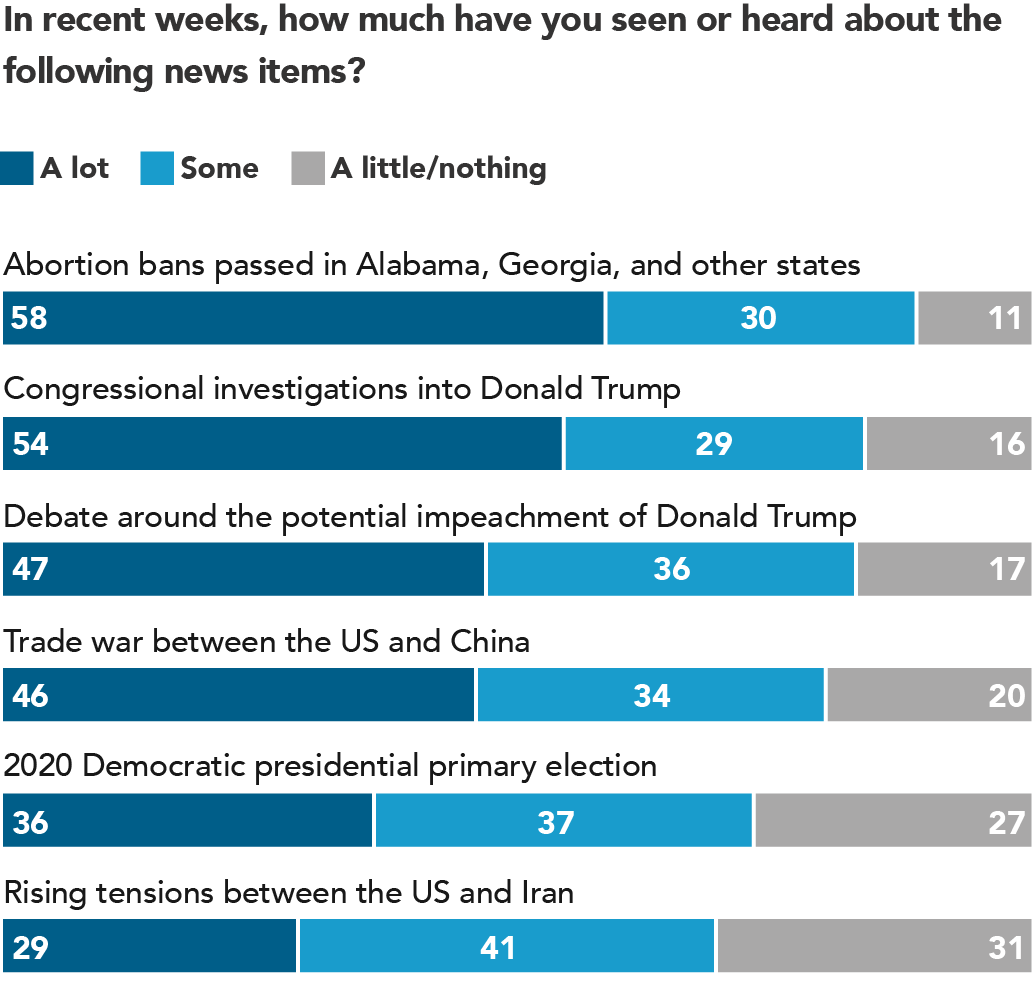
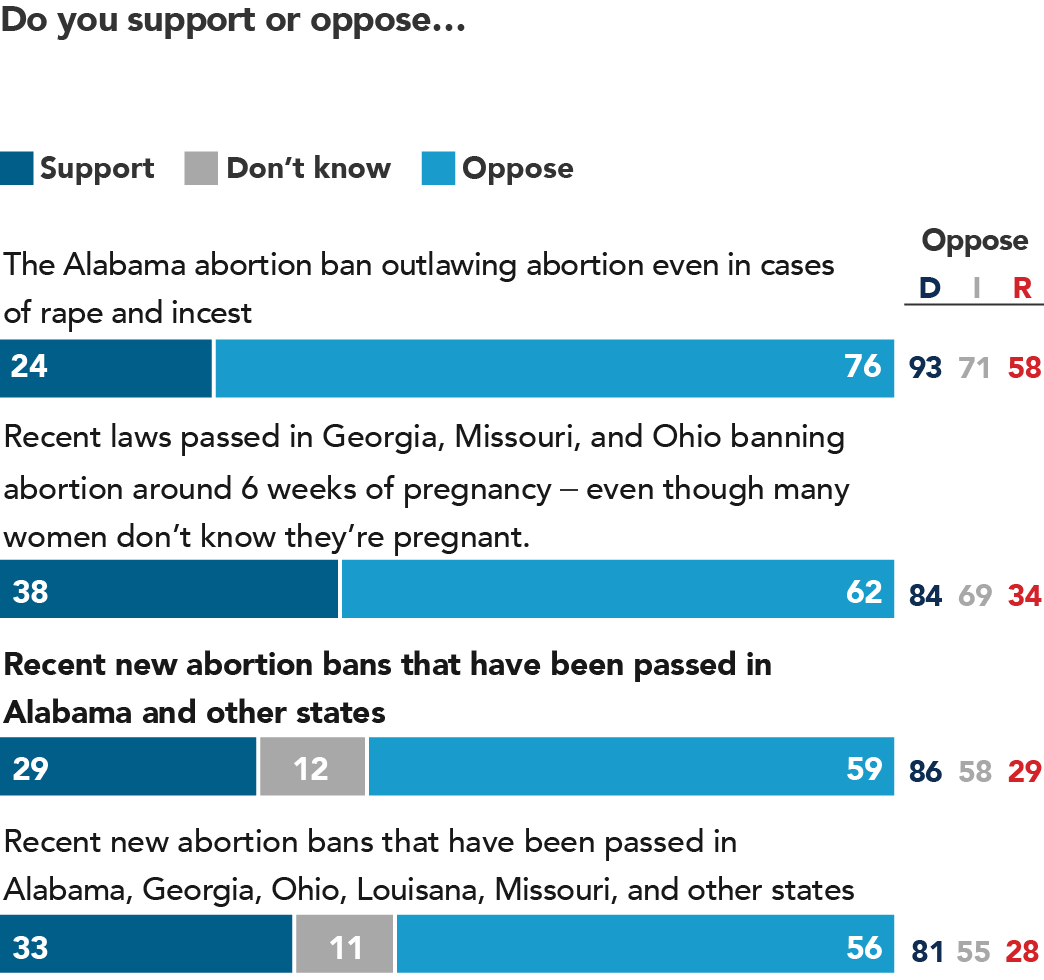
Biggest concern about the bans: they take away women’s rights.
While recent abortion bans are already deeply unpopular, Navigator also identifies room to further define the bans and harden opposition. The best way to talk about the abortion bans is to tap into the public’s concerns that they take away women’s rights and freedoms. Americans find this framing much more salient than “attacking” or “endangering” women, particularly among a key group who support abortion rights, but oppose abortion for themselves. In addition, this rights-focused language is more effective than focusing on the politicians passing these anti-choice laws.
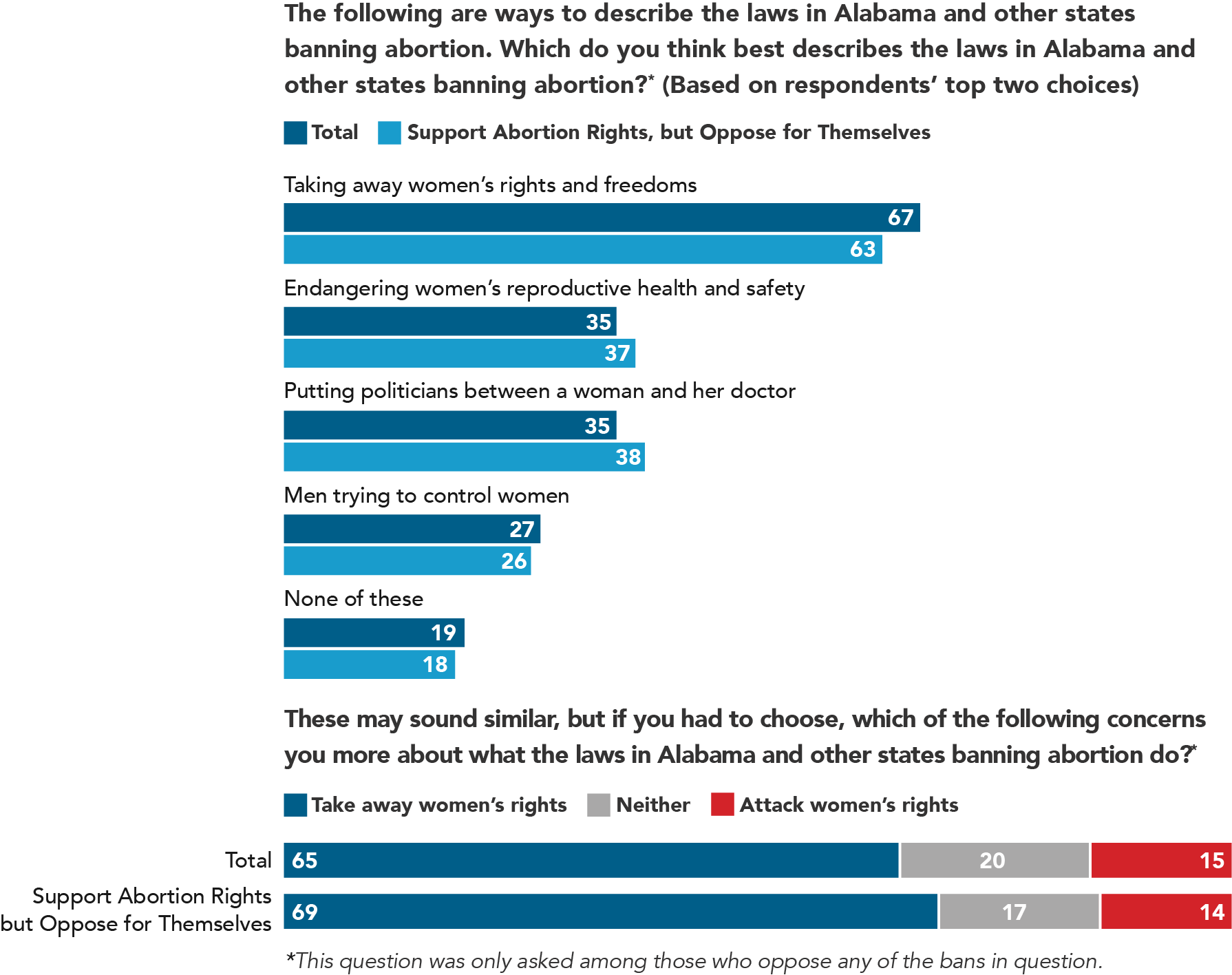
The Fault in Simplistic Measures of Abortion Attitudes
There are many different ways to measure attitudes on abortion, but far too often the issue is presented as two equal opposing groups in America – those who support abortion rights and those who don’t. But that presentation could not be further from the truth.
No matter how we frame the question, strong majorities are in favor of abortion rights. A majority of Americans label themselves pro-choice (55% pro-choice/39% pro-life) and believe abortion should be legal (54% legal/40% limited or illegal).
Further, a tiny percentage of America holds extremely restrictive views. Just 10% of Americans say “abortion should be illegal in all circumstances.” Just 12% strongly support the Alabama law (compared to 56% who strongly oppose it).
But it’s important to note that many people support abortion rights, but would not consider an abortion for themselves. Roughly one-third of Americans (36%) comprise a key group that are against abortion for themselves and their family, but think the government shouldn’t prevent a woman from making that decision for themselves. This important group largely describes themselves as pro-choice (62%), but a third (34%) say they are pro-life, showing the fault in that label. These respondents are more likely than the average American to be Independents, Catholics, women under 55, and non-college women.
Sharing information about specific abortion laws and what they will do can help bolster opposition.
Moving away from Alabama specifically and to the details of various proposed bans more broadly, we again see clear, pervasive support for abortion rights. There was no abortion regulation that was considered a good idea – from making rape and incest victims give birth, even if the victim is a child, to requiring women to carry a pregnancy to term when they know the baby won’t survive, to imprisoning doctors who perform an abortion for up to 99 years.
Those saying these specific restrictions are bad ideas outpace opposition to the abortion bans generally. Moreover, they are considered bad ideas at higher rates among those personally against abortion but who do not think government should interfere in a woman’s choice to have one.
From bad to worse: additional specifics further drive opposition to conservative abortion policy.
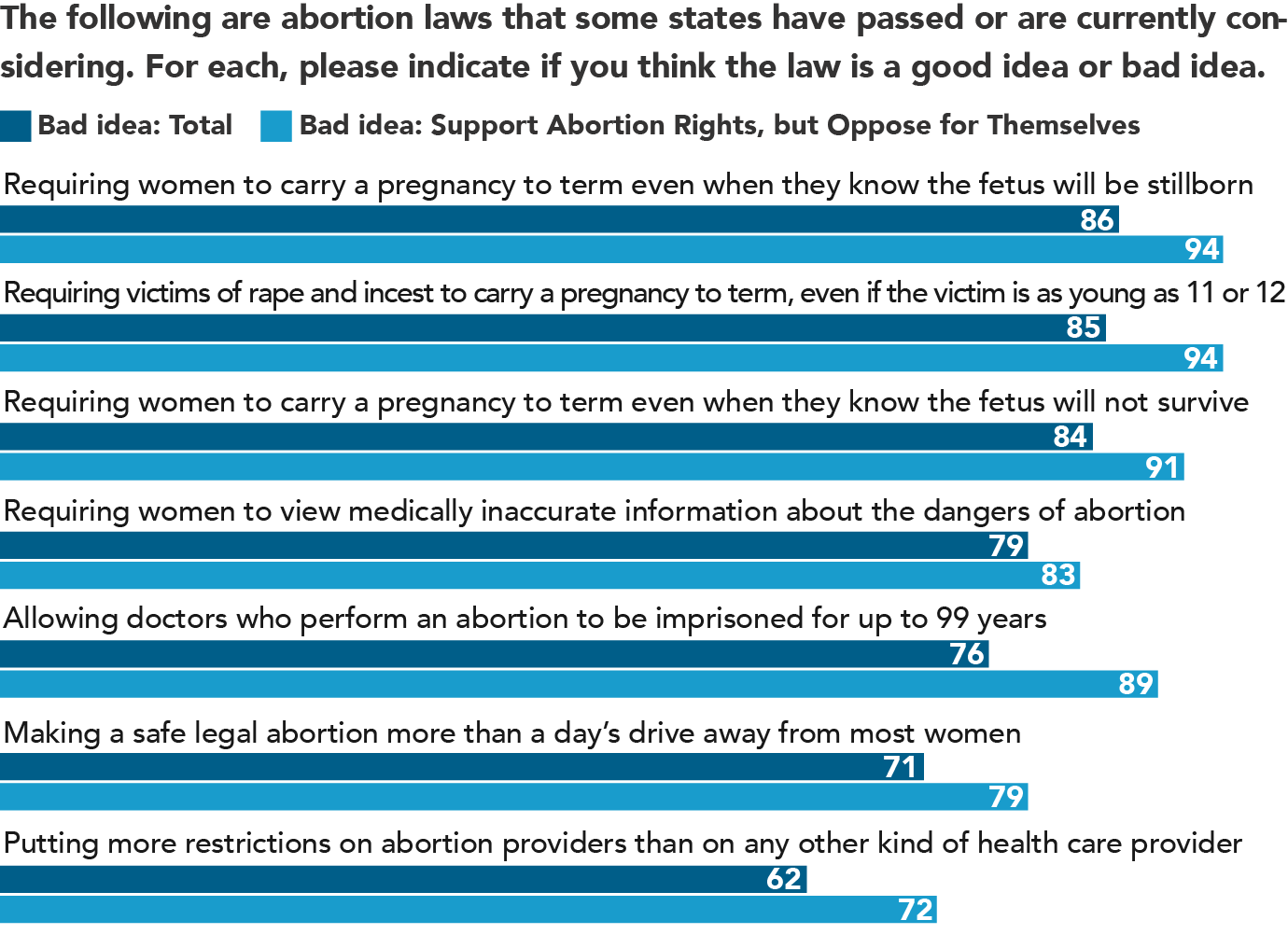
In a language test asking respondents to select the words that best describe the abortion bans, “anti-women” (35%), “government overreach” (34%), and “oppressive” (32%) rise to the top overall. Other words work with different partisan affiliations – “dangerous” works well with Democrats, while “extreme” works well with Independents and Republicans. Notably, “government overreach” resonates significantly among those who are personally against abortion, but do not think government should prevent women from making that decision for themselves (45%). The same language test shows that Americans don’t think words like “radical,” “inhumane,” “unsafe,” and “reckless” are the right way to describe the bans.
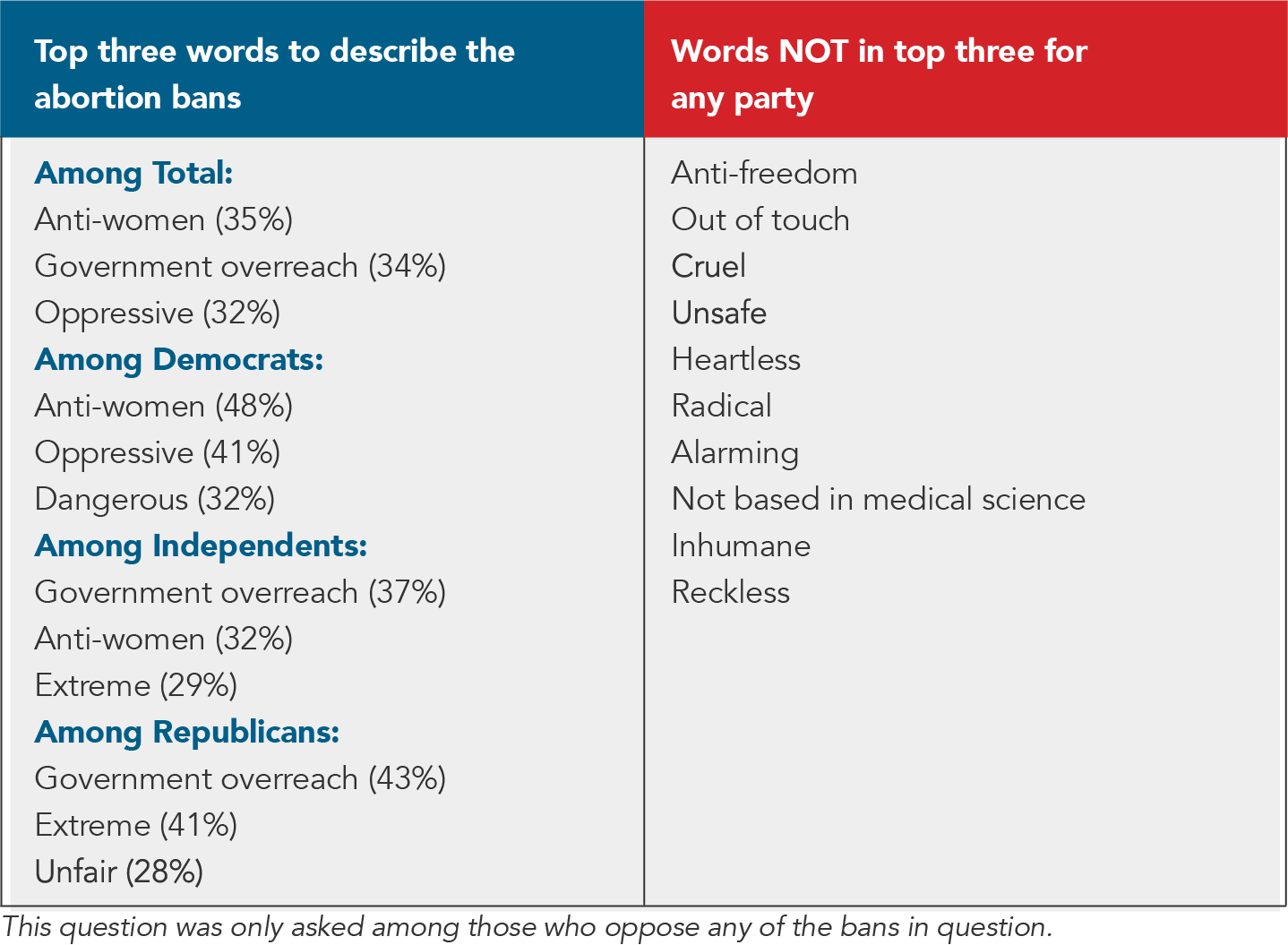
When it comes to abortion rights, keep women’s rights central, and focus on what’s happening now.
Navigator looked at several potential messages to undermine Republicans’ argument that the abortion bans are meant to protect the sanctity of life. Messages that focus on Republicans applying one- size-fits-all laws to personal situations they don’t understand, and doing nothing to actually help women get the care they need perform best.
The most convincing pro-choice message is one providing context for why a woman might need an abortion – sometimes a woman gets a diagnosis that a pregnancy is threatening her life or that the fetus won’t survive – and explains Republicans are interfering in personal situations they don’t understand by trying to apply one- size-fits-all laws to complex and personal health care decisions. This was one of five framings that bested a conservative “sanctity of life” argument by at least 24 points and won over 70% of the key bloc of Americans who support abortion rights, but oppose abortion for themselves.
Another strong pro-choice message is one that reinforces the belief that Republicans are trying to take away women’s rights: rather than helping women access care, they’re taking away a woman’s right to make decisions about her body and her future (64% overall, 77% among that key bloc).
While they still win against the Republican argument, this survey shows that suggesting Republicans are trying to take us backward with these abortion bans (61% overall, 66% among that key bloc), or playing politics is less effective (62% overall, 74% among that key bloc).
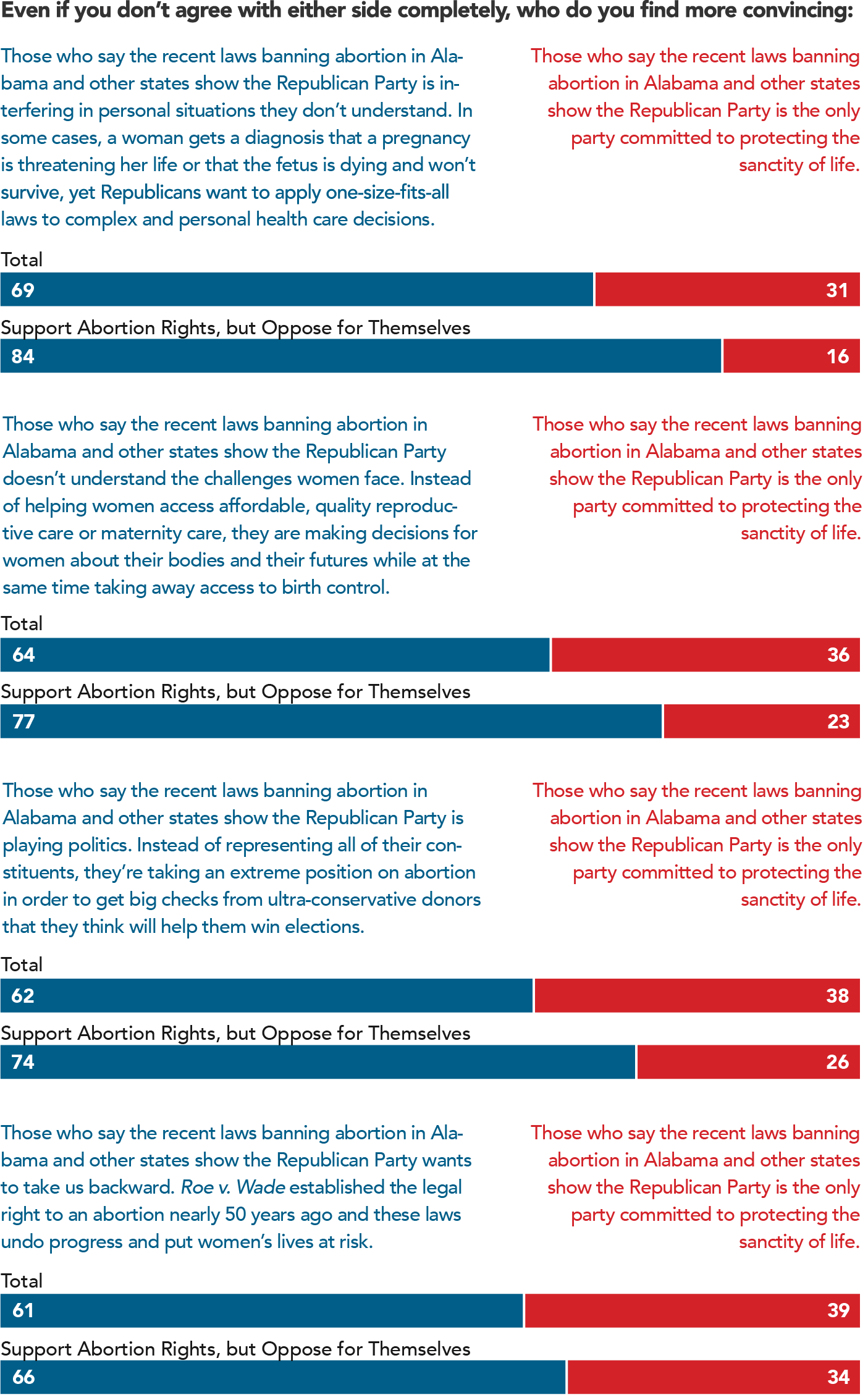
About The Study
Global Strategy Group conducted a public opinion survey among a sample of 1,113 registered voters between May 31-June 3, 2019. 113 additional interviews were conducted among political independents with no partisan lean. The survey was conducted online, recruiting respondents from multiple opt-in online panel vendors. Respondents were verified against a voter file and special care was taken to ensure the demographic composition of our sample matched that of the national registered voter population across a variety of demographic variables.

